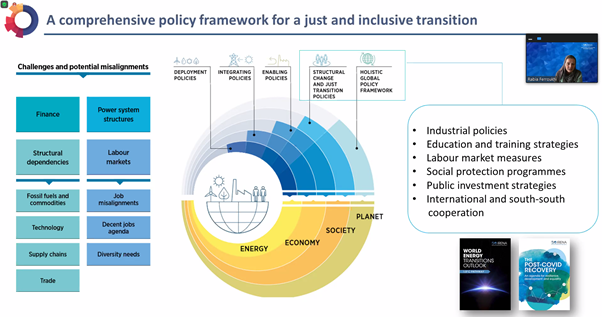This year’s seventh edition of the IRENA Legislators Forum sought to catalyse political actions to accelerate the energy transformation. By taking up the COP26 outcomes from November 2021, the forums’ participants stressed once again that now is the last opportunity to translate commitments made under the Paris Agreement and Agenda 2030 into action, if we want to limit global warming to 1.5°C. Under the headline ‘Parliamentary and regulatory actions to drive national energy transition policies: from commitment to action’, the event convened legislators, energy experts, parliamentary networks, and energy regulators.
Discussions revolved around the different countries’ various existing conditions, the regulatory and policy requirements, the responsibilities of all levels of legislation and the necessary actions and approaches to solving the climate crisis by transforming the energy system towards a green and renewable energy power generation.
As participants of the IRENA Legislators Forum repeatedly emphasised: members of parliaments around the world and on all levels of governance are key actors for a successful energy transition. By developing and setting up legislative frameworks and by reliably directing long-term investments into sustainable and clean energy solutions, legislators carry great responsibility. Only through strong political will and appropriate actions can this be achieved.
Among panellists, it has been suggested that only by considering at least three key factors – 1. the opportunities and requirements of a more flexible energy system, 2. the necessity to build a new network at low costs to protect consumers from price volatility, and 3. by protecting and also engaging consumers – can the energy transition be socially and economically sustainable. In particular, the last point could not have been stressed enough by regulators and MPs alike. By protecting energy consumers, especially individual end-users within their constituency, MPs are strongly bound to the beneficiaries of an energy transition towards renewables. As Kandeh Yumkella, moderator of the forum and member of the Parliament of Sierra Leone put it: we must come “from political commitments to kilowatt hours for real people”. An inclusive, fair and affordable conversion of the energy system that leaves no one behind and which costs are borne fairly, must be the aim and is also a necessary condition to increase acceptance for renewables and thus for the success of the energy transition.
Each country has to deal with very unique preconditions – be it political, economic or even geographical such as Indonesia with developing an energy system across more than 17.000 islands – path dependencies and circumstances of energy availability, access, reliability, etc. However, considering the looming climate crisis and shrinking window of opportunity to counteract, MPs can use their power for change to make significant changes to the energy situation in their area of influence by speeding up and scaling up – not only ambitions and commitments – but actual Renewable Energy deployment.
“Legislators must be at the forefront of RE becoming the norm and not the exception.”
Martin Chungong, Secretary General of the Inter-Parliamentary Union (IPU)
Developing dynamic and flexible, yet clear, predictable, and favourable legislation is a key condition for creating the framework for the success of set targets and commitments. To guarantee a smooth structural change as well as a just transition that leaves no one behind, policy frameworks on renewable energy developed and passed by parliaments have to cover not only industrial policies and public investment strategies. They must encompass education and training strategies as well as labour market measures, social protection programmes and should be in close cooperation and coordination with international, regional and south-south collaboration, highlights Rabia Ferroukhi (IRENA).

Meanwhile, having a clear roadmap of targets, scenarios and timelines available can be a determining factor of the outcome of the energy transition. Involving a broad range of relevant stakeholders, from academia to civil society, can anchor the transition in society and showcase how, when and under which conditions the transition of the energy system towards renewable energy, the realisation of the 2030 Agenda and commitments under the Paris Agreement can be met. By monitoring the actions and commitments of their governments, MPs have to further push their governments to increase action and hold them accountable in case of non-performance or non-compliance. Cooperation among MPs from different legislative levels or various countries can contribute to strengthening the foundation for good renewable energy-related policymaking. The Global Renewables Congress tackles this challenge by bringing together parliamentarians of different committees (energy, climate change, health, economy, mobility, digitalisation, education, etc.) within as well as across parliaments. For MPs to realise and assume the cross-cutting nature and potential of renewable energy generation and upscaling its deployment has the potential to unleash far-reaching transformative action, including societal and economic change of a just transition as well as
Recent events and developments such as the still-raging COVID-19 pandemic, fluctuations in energy prices due to supply bottlenecks and a lack of transparency in the pricing of fossil energy sources as well as discussions around the questionable discussion on nuclear and gas being labelled as sustainable investments provide parliamentarians with the opportunity to act on a green and clean energy transition.
Over the next years, the Global Renewables Congress will continue this deep and diverse discussion on actions by deliberating on key components of a comprehensive and coordinated strategy on realising commitments and committing to developing material to disseminate good RE policies, lessons learned and further facilitate exchange among its members and other key parliamentary and societal stakeholders related to upscaling renewable energy.
